Entrepreneurship and Small Business Management - UK Economy Impact
VerifiedAdded on 2020/10/05
|11
|3050
|61
Report
AI Summary
This report provides a comprehensive overview of entrepreneurship and small business management, focusing on various types of entrepreneurial ventures, their similarities and differences, and their significant impact on the UK economy. It examines small-scale, social, scalable, and large enterprises, highlighting their roles, characteristics, and objectives. The report further analyzes the contribution of small and micro ventures to the UK economy, emphasizing their importance in increasing employment, raising living standards, and driving national economic growth. Additionally, it explores the traits and skills of successful entrepreneurs, using Steve Jobs and Bill Gates as examples, and discusses how entrepreneurial personalities, backgrounds, and experiences can either foster or hinder success. The analysis incorporates the Big Five personality model to assess key entrepreneurial traits such as extraversion, agreeableness, conscientiousness, neuroticism, and openness, providing a detailed understanding of the multifaceted nature of entrepreneurship.
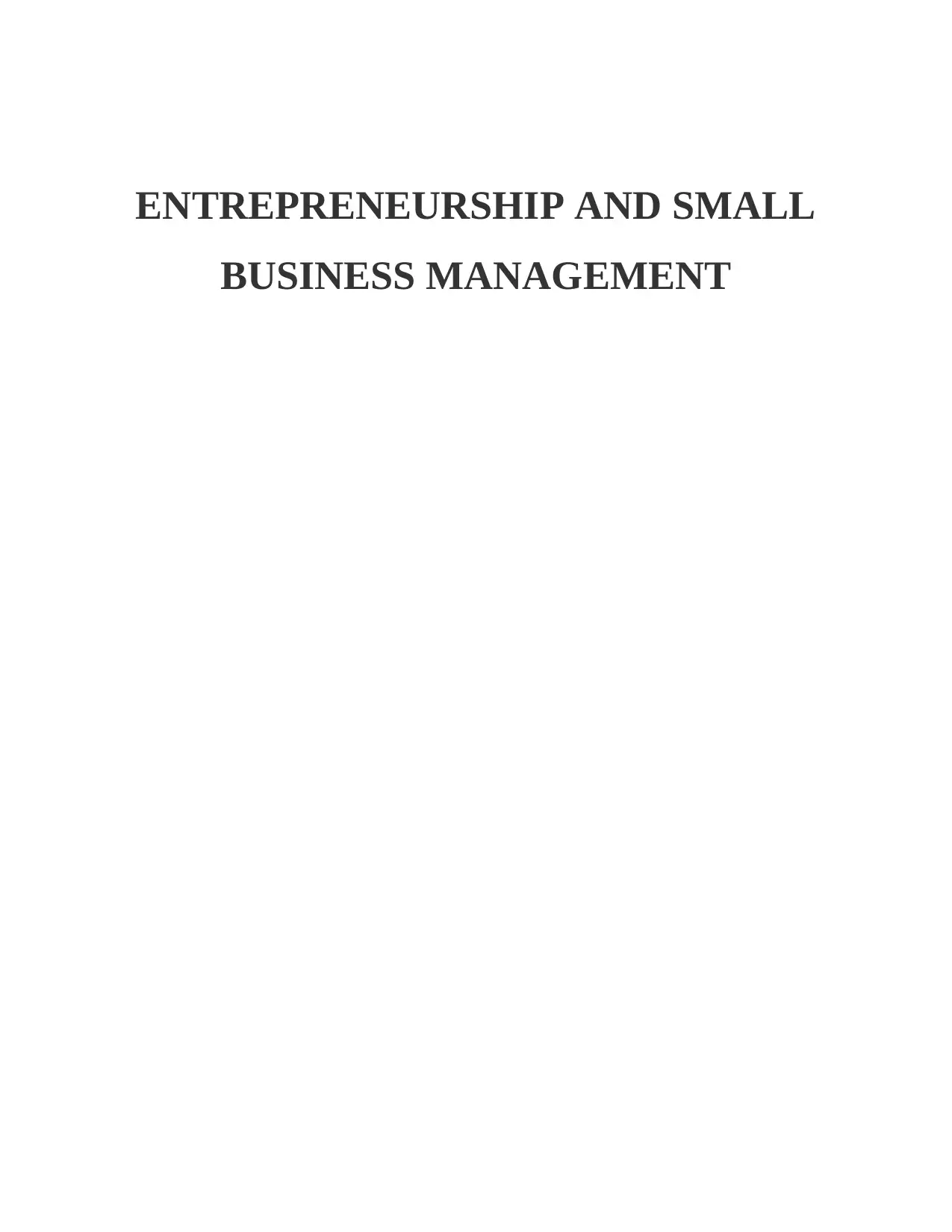
ENTREPRENEURSHIP AND SMALL
BUSINESS MANAGEMENT
BUSINESS MANAGEMENT
Paraphrase This Document
Need a fresh take? Get an instant paraphrase of this document with our AI Paraphraser
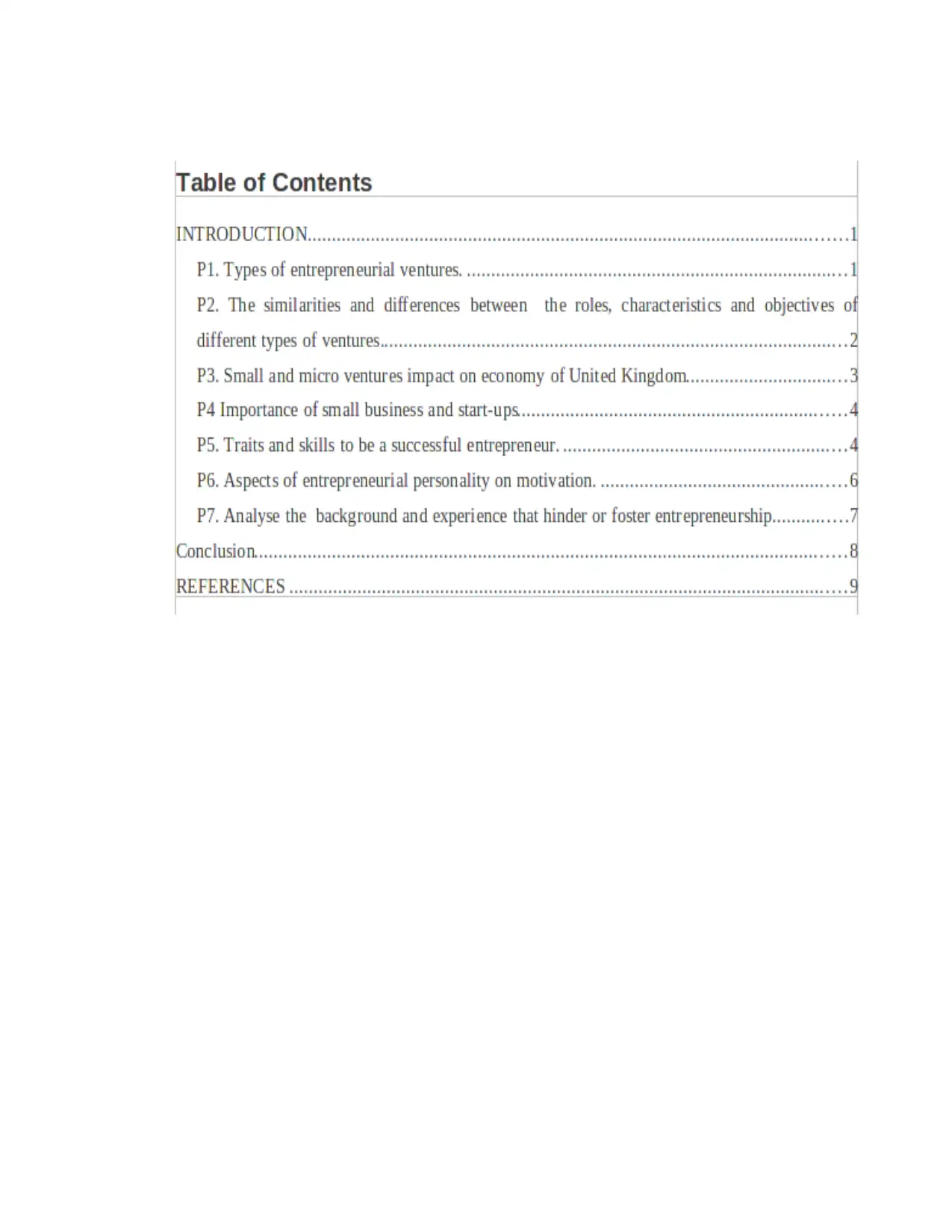
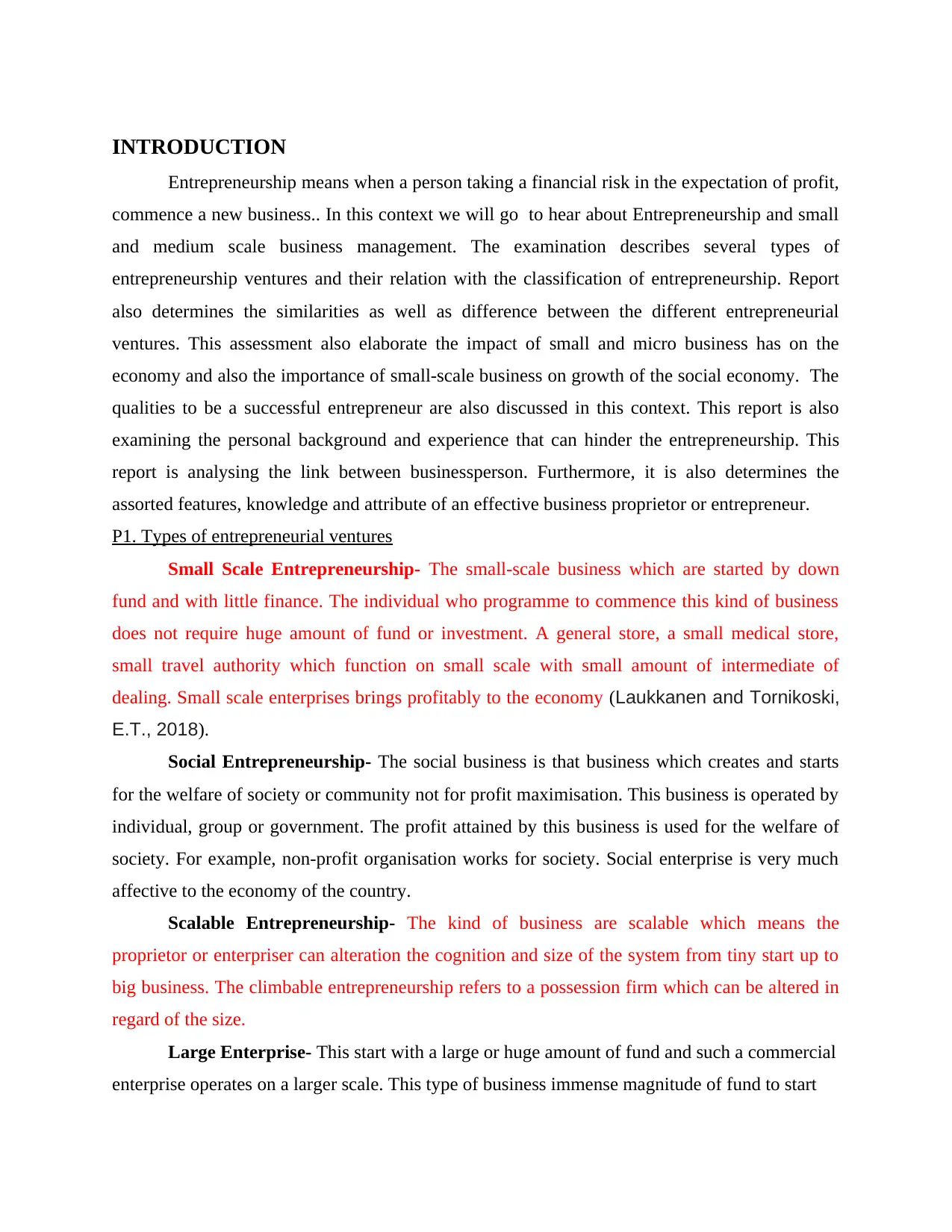
INTRODUCTION
Entrepreneurship means when a person taking a financial risk in the expectation of profit,
commence a new business.. In this context we will go to hear about Entrepreneurship and small
and medium scale business management. The examination describes several types of
entrepreneurship ventures and their relation with the classification of entrepreneurship. Report
also determines the similarities as well as difference between the different entrepreneurial
ventures. This assessment also elaborate the impact of small and micro business has on the
economy and also the importance of small-scale business on growth of the social economy. The
qualities to be a successful entrepreneur are also discussed in this context. This report is also
examining the personal background and experience that can hinder the entrepreneurship. This
report is analysing the link between businessperson. Furthermore, it is also determines the
assorted features, knowledge and attribute of an effective business proprietor or entrepreneur.
P1. Types of entrepreneurial ventures
Small Scale Entrepreneurship- The small-scale business which are started by down
fund and with little finance. The individual who programme to commence this kind of business
does not require huge amount of fund or investment. A general store, a small medical store,
small travel authority which function on small scale with small amount of intermediate of
dealing. Small scale enterprises brings profitably to the economy (Laukkanen and Tornikoski,
E.T., 2018).
Social Entrepreneurship- The social business is that business which creates and starts
for the welfare of society or community not for profit maximisation. This business is operated by
individual, group or government. The profit attained by this business is used for the welfare of
society. For example, non-profit organisation works for society. Social enterprise is very much
affective to the economy of the country.
Scalable Entrepreneurship- The kind of business are scalable which means the
proprietor or enterpriser can alteration the cognition and size of the system from tiny start up to
big business. The climbable entrepreneurship refers to a possession firm which can be altered in
regard of the size.
Large Enterprise- This start with a large or huge amount of fund and such a commercial
enterprise operates on a larger scale. This type of business immense magnitude of fund to start
Entrepreneurship means when a person taking a financial risk in the expectation of profit,
commence a new business.. In this context we will go to hear about Entrepreneurship and small
and medium scale business management. The examination describes several types of
entrepreneurship ventures and their relation with the classification of entrepreneurship. Report
also determines the similarities as well as difference between the different entrepreneurial
ventures. This assessment also elaborate the impact of small and micro business has on the
economy and also the importance of small-scale business on growth of the social economy. The
qualities to be a successful entrepreneur are also discussed in this context. This report is also
examining the personal background and experience that can hinder the entrepreneurship. This
report is analysing the link between businessperson. Furthermore, it is also determines the
assorted features, knowledge and attribute of an effective business proprietor or entrepreneur.
P1. Types of entrepreneurial ventures
Small Scale Entrepreneurship- The small-scale business which are started by down
fund and with little finance. The individual who programme to commence this kind of business
does not require huge amount of fund or investment. A general store, a small medical store,
small travel authority which function on small scale with small amount of intermediate of
dealing. Small scale enterprises brings profitably to the economy (Laukkanen and Tornikoski,
E.T., 2018).
Social Entrepreneurship- The social business is that business which creates and starts
for the welfare of society or community not for profit maximisation. This business is operated by
individual, group or government. The profit attained by this business is used for the welfare of
society. For example, non-profit organisation works for society. Social enterprise is very much
affective to the economy of the country.
Scalable Entrepreneurship- The kind of business are scalable which means the
proprietor or enterpriser can alteration the cognition and size of the system from tiny start up to
big business. The climbable entrepreneurship refers to a possession firm which can be altered in
regard of the size.
Large Enterprise- This start with a large or huge amount of fund and such a commercial
enterprise operates on a larger scale. This type of business immense magnitude of fund to start
⊘ This is a preview!⊘
Do you want full access?
Subscribe today to unlock all pages.

Trusted by 1+ million students worldwide
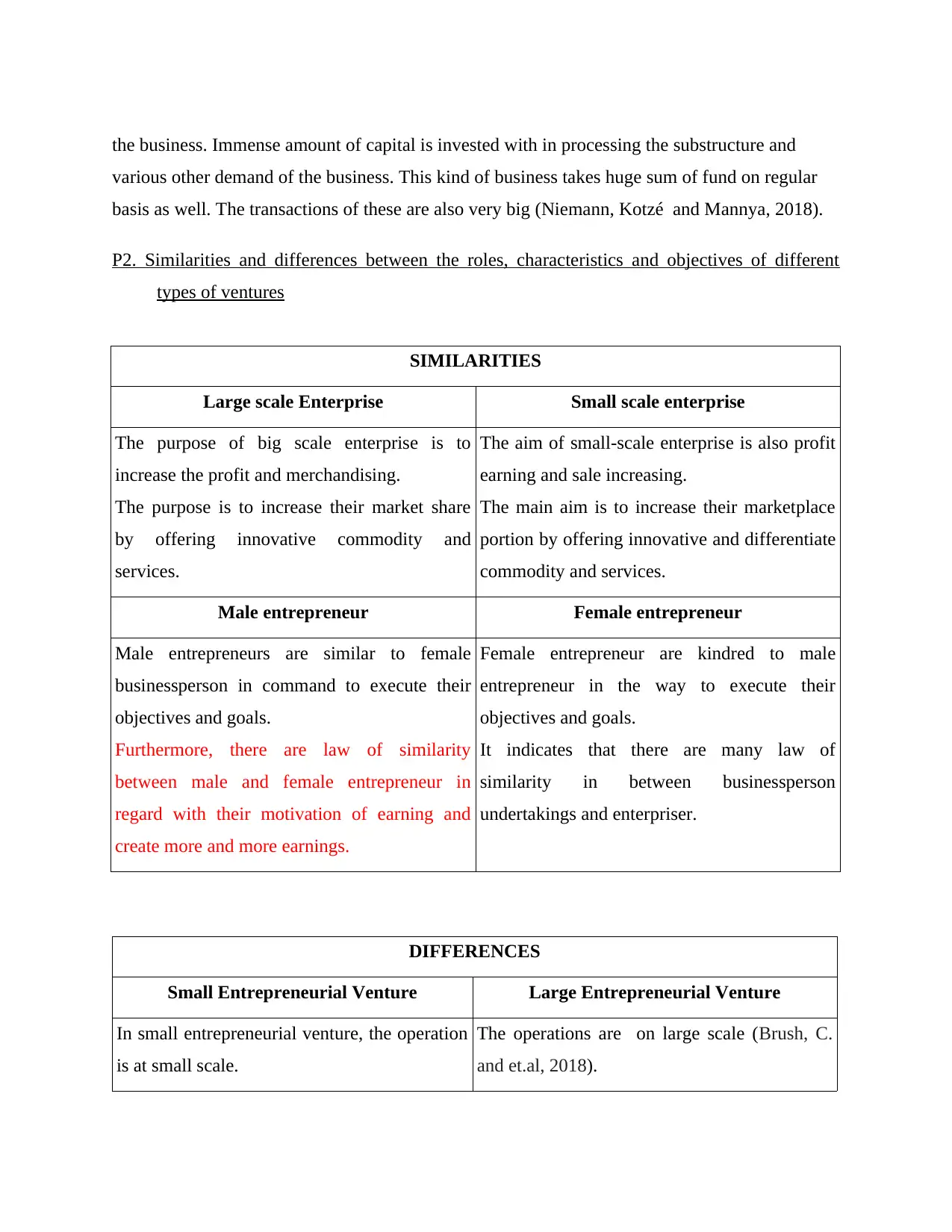
the business. Immense amount of capital is invested with in processing the substructure and
various other demand of the business. This kind of business takes huge sum of fund on regular
basis as well. The transactions of these are also very big (Niemann, Kotzé and Mannya, 2018).
P2. Similarities and differences between the roles, characteristics and objectives of different
types of ventures
SIMILARITIES
Large scale Enterprise Small scale enterprise
The purpose of big scale enterprise is to
increase the profit and merchandising.
The purpose is to increase their market share
by offering innovative commodity and
services.
The aim of small-scale enterprise is also profit
earning and sale increasing.
The main aim is to increase their marketplace
portion by offering innovative and differentiate
commodity and services.
Male entrepreneur Female entrepreneur
Male entrepreneurs are similar to female
businessperson in command to execute their
objectives and goals.
Furthermore, there are law of similarity
between male and female entrepreneur in
regard with their motivation of earning and
create more and more earnings.
Female entrepreneur are kindred to male
entrepreneur in the way to execute their
objectives and goals.
It indicates that there are many law of
similarity in between businessperson
undertakings and enterpriser.
DIFFERENCES
Small Entrepreneurial Venture Large Entrepreneurial Venture
In small entrepreneurial venture, the operation
is at small scale.
The operations are on large scale (Brush, C.
and et.al, 2018).
various other demand of the business. This kind of business takes huge sum of fund on regular
basis as well. The transactions of these are also very big (Niemann, Kotzé and Mannya, 2018).
P2. Similarities and differences between the roles, characteristics and objectives of different
types of ventures
SIMILARITIES
Large scale Enterprise Small scale enterprise
The purpose of big scale enterprise is to
increase the profit and merchandising.
The purpose is to increase their market share
by offering innovative commodity and
services.
The aim of small-scale enterprise is also profit
earning and sale increasing.
The main aim is to increase their marketplace
portion by offering innovative and differentiate
commodity and services.
Male entrepreneur Female entrepreneur
Male entrepreneurs are similar to female
businessperson in command to execute their
objectives and goals.
Furthermore, there are law of similarity
between male and female entrepreneur in
regard with their motivation of earning and
create more and more earnings.
Female entrepreneur are kindred to male
entrepreneur in the way to execute their
objectives and goals.
It indicates that there are many law of
similarity in between businessperson
undertakings and enterpriser.
DIFFERENCES
Small Entrepreneurial Venture Large Entrepreneurial Venture
In small entrepreneurial venture, the operation
is at small scale.
The operations are on large scale (Brush, C.
and et.al, 2018).
Paraphrase This Document
Need a fresh take? Get an instant paraphrase of this document with our AI Paraphraser
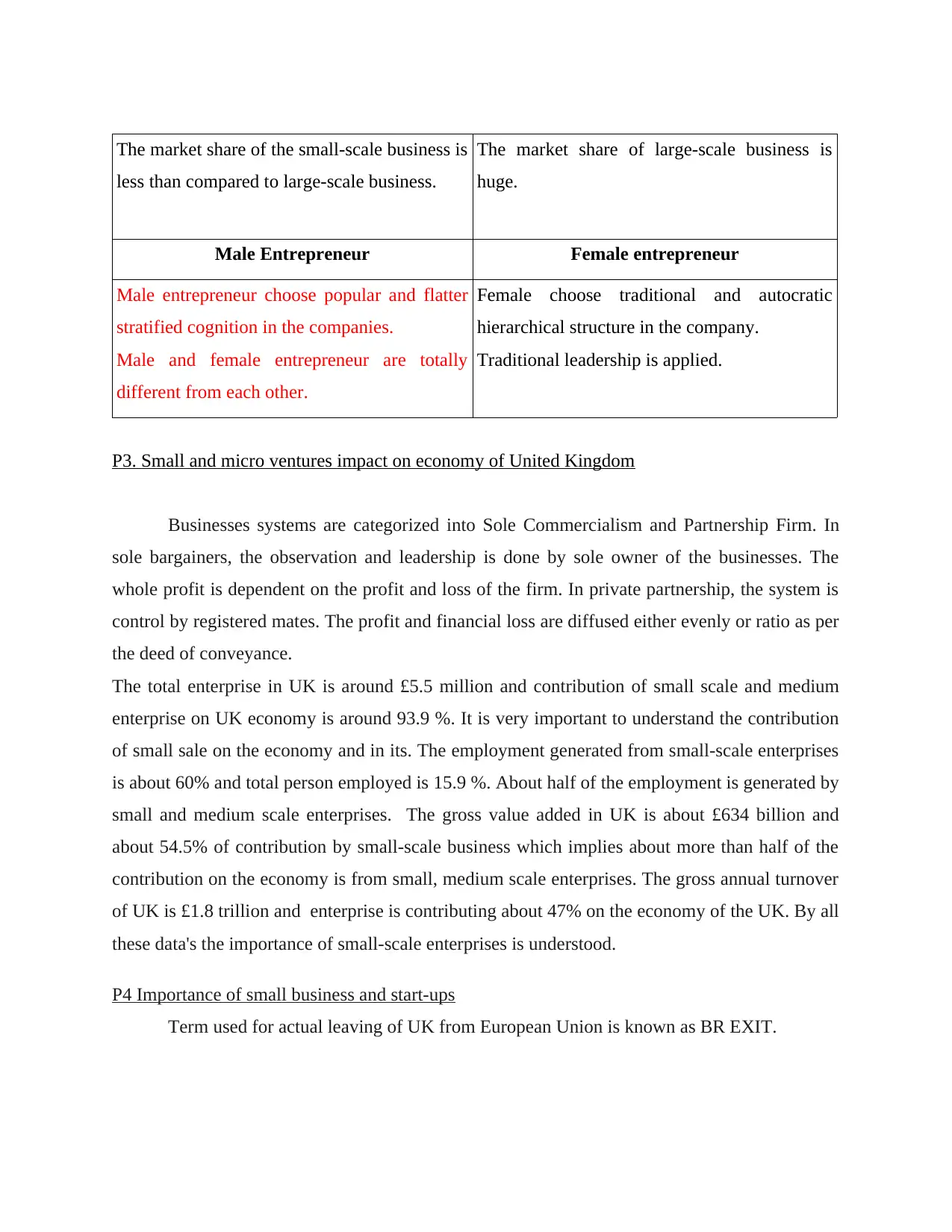
The market share of the small-scale business is
less than compared to large-scale business.
The market share of large-scale business is
huge.
Male Entrepreneur Female entrepreneur
Male entrepreneur choose popular and flatter
stratified cognition in the companies.
Male and female entrepreneur are totally
different from each other.
Female choose traditional and autocratic
hierarchical structure in the company.
Traditional leadership is applied.
P3. Small and micro ventures impact on economy of United Kingdom
Businesses systems are categorized into Sole Commercialism and Partnership Firm. In
sole bargainers, the observation and leadership is done by sole owner of the businesses. The
whole profit is dependent on the profit and loss of the firm. In private partnership, the system is
control by registered mates. The profit and financial loss are diffused either evenly or ratio as per
the deed of conveyance.
The total enterprise in UK is around £5.5 million and contribution of small scale and medium
enterprise on UK economy is around 93.9 %. It is very important to understand the contribution
of small sale on the economy and in its. The employment generated from small-scale enterprises
is about 60% and total person employed is 15.9 %. About half of the employment is generated by
small and medium scale enterprises. The gross value added in UK is about £634 billion and
about 54.5% of contribution by small-scale business which implies about more than half of the
contribution on the economy is from small, medium scale enterprises. The gross annual turnover
of UK is £1.8 trillion and enterprise is contributing about 47% on the economy of the UK. By all
these data's the importance of small-scale enterprises is understood.
P4 Importance of small business and start-ups
Term used for actual leaving of UK from European Union is known as BR EXIT.
less than compared to large-scale business.
The market share of large-scale business is
huge.
Male Entrepreneur Female entrepreneur
Male entrepreneur choose popular and flatter
stratified cognition in the companies.
Male and female entrepreneur are totally
different from each other.
Female choose traditional and autocratic
hierarchical structure in the company.
Traditional leadership is applied.
P3. Small and micro ventures impact on economy of United Kingdom
Businesses systems are categorized into Sole Commercialism and Partnership Firm. In
sole bargainers, the observation and leadership is done by sole owner of the businesses. The
whole profit is dependent on the profit and loss of the firm. In private partnership, the system is
control by registered mates. The profit and financial loss are diffused either evenly or ratio as per
the deed of conveyance.
The total enterprise in UK is around £5.5 million and contribution of small scale and medium
enterprise on UK economy is around 93.9 %. It is very important to understand the contribution
of small sale on the economy and in its. The employment generated from small-scale enterprises
is about 60% and total person employed is 15.9 %. About half of the employment is generated by
small and medium scale enterprises. The gross value added in UK is about £634 billion and
about 54.5% of contribution by small-scale business which implies about more than half of the
contribution on the economy is from small, medium scale enterprises. The gross annual turnover
of UK is £1.8 trillion and enterprise is contributing about 47% on the economy of the UK. By all
these data's the importance of small-scale enterprises is understood.
P4 Importance of small business and start-ups
Term used for actual leaving of UK from European Union is known as BR EXIT.
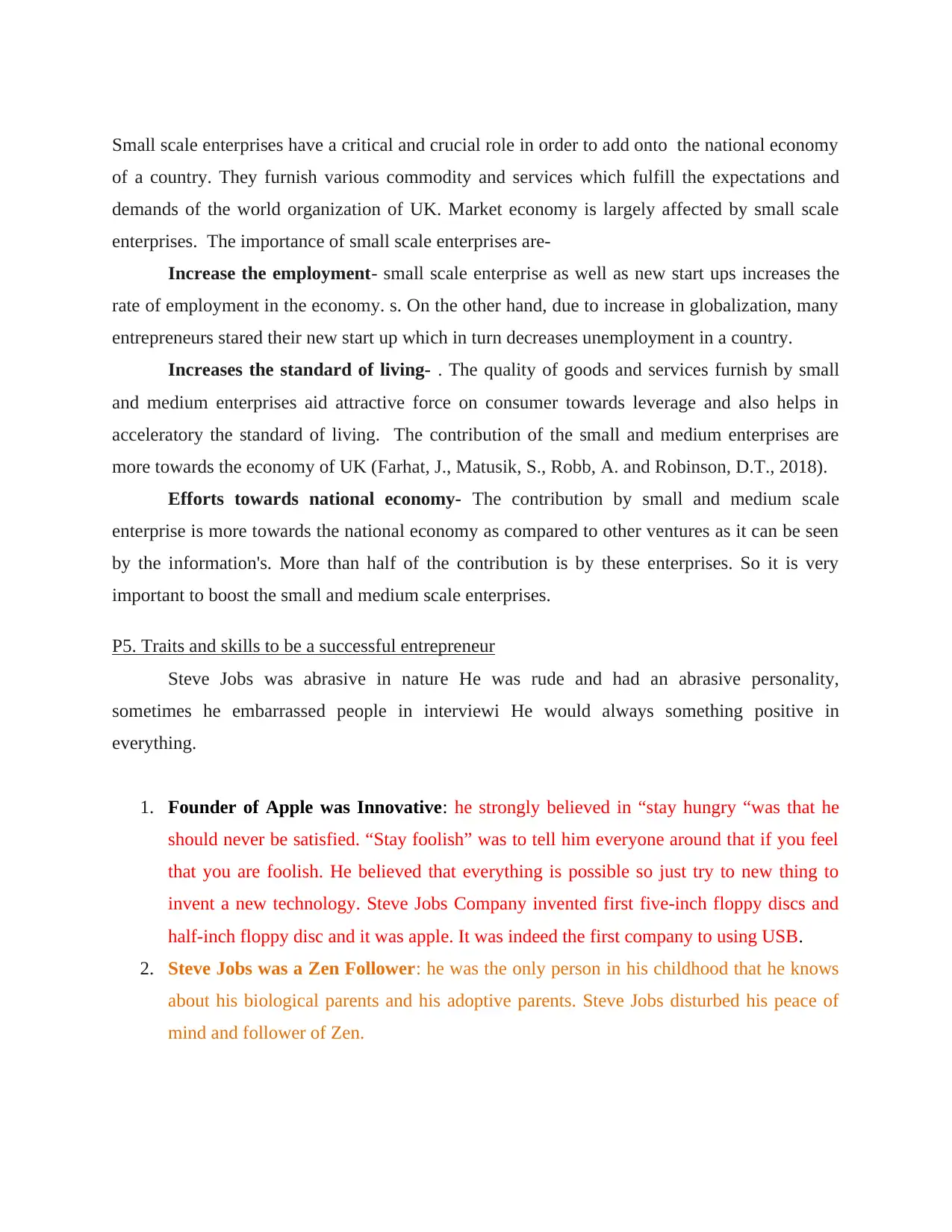
Small scale enterprises have a critical and crucial role in order to add onto the national economy
of a country. They furnish various commodity and services which fulfill the expectations and
demands of the world organization of UK. Market economy is largely affected by small scale
enterprises. The importance of small scale enterprises are-
Increase the employment- small scale enterprise as well as new start ups increases the
rate of employment in the economy. s. On the other hand, due to increase in globalization, many
entrepreneurs stared their new start up which in turn decreases unemployment in a country.
Increases the standard of living- . The quality of goods and services furnish by small
and medium enterprises aid attractive force on consumer towards leverage and also helps in
acceleratory the standard of living. The contribution of the small and medium enterprises are
more towards the economy of UK (Farhat, J., Matusik, S., Robb, A. and Robinson, D.T., 2018).
Efforts towards national economy- The contribution by small and medium scale
enterprise is more towards the national economy as compared to other ventures as it can be seen
by the information's. More than half of the contribution is by these enterprises. So it is very
important to boost the small and medium scale enterprises.
P5. Traits and skills to be a successful entrepreneur
Steve Jobs was abrasive in nature He was rude and had an abrasive personality,
sometimes he embarrassed people in interviewi He would always something positive in
everything.
1. Founder of Apple was Innovative: he strongly believed in “stay hungry “was that he
should never be satisfied. “Stay foolish” was to tell him everyone around that if you feel
that you are foolish. He believed that everything is possible so just try to new thing to
invent a new technology. Steve Jobs Company invented first five-inch floppy discs and
half-inch floppy disc and it was apple. It was indeed the first company to using USB.
2. Steve Jobs was a Zen Follower: he was the only person in his childhood that he knows
about his biological parents and his adoptive parents. Steve Jobs disturbed his peace of
mind and follower of Zen.
of a country. They furnish various commodity and services which fulfill the expectations and
demands of the world organization of UK. Market economy is largely affected by small scale
enterprises. The importance of small scale enterprises are-
Increase the employment- small scale enterprise as well as new start ups increases the
rate of employment in the economy. s. On the other hand, due to increase in globalization, many
entrepreneurs stared their new start up which in turn decreases unemployment in a country.
Increases the standard of living- . The quality of goods and services furnish by small
and medium enterprises aid attractive force on consumer towards leverage and also helps in
acceleratory the standard of living. The contribution of the small and medium enterprises are
more towards the economy of UK (Farhat, J., Matusik, S., Robb, A. and Robinson, D.T., 2018).
Efforts towards national economy- The contribution by small and medium scale
enterprise is more towards the national economy as compared to other ventures as it can be seen
by the information's. More than half of the contribution is by these enterprises. So it is very
important to boost the small and medium scale enterprises.
P5. Traits and skills to be a successful entrepreneur
Steve Jobs was abrasive in nature He was rude and had an abrasive personality,
sometimes he embarrassed people in interviewi He would always something positive in
everything.
1. Founder of Apple was Innovative: he strongly believed in “stay hungry “was that he
should never be satisfied. “Stay foolish” was to tell him everyone around that if you feel
that you are foolish. He believed that everything is possible so just try to new thing to
invent a new technology. Steve Jobs Company invented first five-inch floppy discs and
half-inch floppy disc and it was apple. It was indeed the first company to using USB.
2. Steve Jobs was a Zen Follower: he was the only person in his childhood that he knows
about his biological parents and his adoptive parents. Steve Jobs disturbed his peace of
mind and follower of Zen.
⊘ This is a preview!⊘
Do you want full access?
Subscribe today to unlock all pages.

Trusted by 1+ million students worldwide
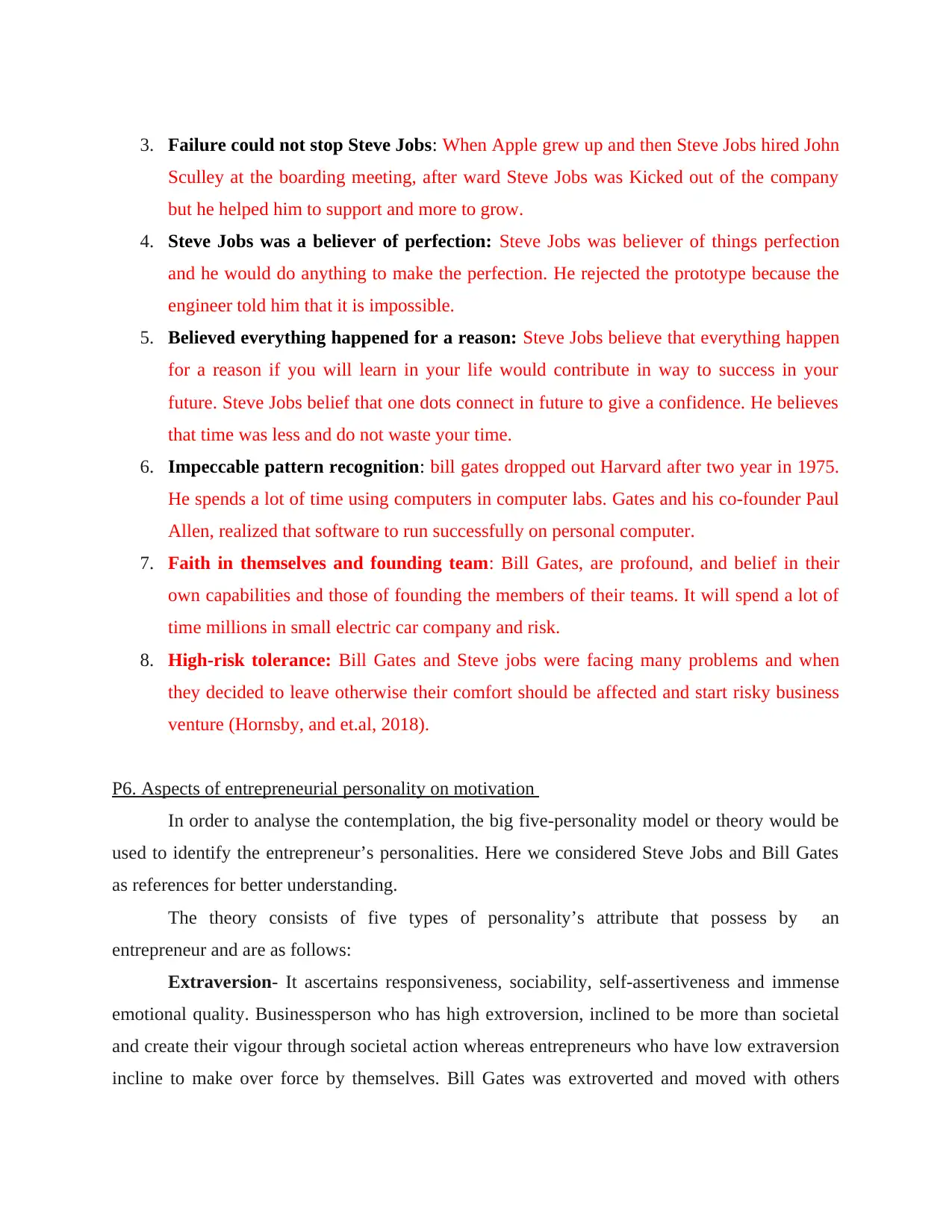
3. Failure could not stop Steve Jobs: When Apple grew up and then Steve Jobs hired John
Sculley at the boarding meeting, after ward Steve Jobs was Kicked out of the company
but he helped him to support and more to grow.
4. Steve Jobs was a believer of perfection: Steve Jobs was believer of things perfection
and he would do anything to make the perfection. He rejected the prototype because the
engineer told him that it is impossible.
5. Believed everything happened for a reason: Steve Jobs believe that everything happen
for a reason if you will learn in your life would contribute in way to success in your
future. Steve Jobs belief that one dots connect in future to give a confidence. He believes
that time was less and do not waste your time.
6. Impeccable pattern recognition: bill gates dropped out Harvard after two year in 1975.
He spends a lot of time using computers in computer labs. Gates and his co-founder Paul
Allen, realized that software to run successfully on personal computer.
7. Faith in themselves and founding team: Bill Gates, are profound, and belief in their
own capabilities and those of founding the members of their teams. It will spend a lot of
time millions in small electric car company and risk.
8. High-risk tolerance: Bill Gates and Steve jobs were facing many problems and when
they decided to leave otherwise their comfort should be affected and start risky business
venture (Hornsby, and et.al, 2018).
P6. Aspects of entrepreneurial personality on motivation
In order to analyse the contemplation, the big five-personality model or theory would be
used to identify the entrepreneur’s personalities. Here we considered Steve Jobs and Bill Gates
as references for better understanding.
The theory consists of five types of personality’s attribute that possess by an
entrepreneur and are as follows:
Extraversion- It ascertains responsiveness, sociability, self-assertiveness and immense
emotional quality. Businessperson who has high extroversion, inclined to be more than societal
and create their vigour through societal action whereas entrepreneurs who have low extraversion
incline to make over force by themselves. Bill Gates was extroverted and moved with others
Sculley at the boarding meeting, after ward Steve Jobs was Kicked out of the company
but he helped him to support and more to grow.
4. Steve Jobs was a believer of perfection: Steve Jobs was believer of things perfection
and he would do anything to make the perfection. He rejected the prototype because the
engineer told him that it is impossible.
5. Believed everything happened for a reason: Steve Jobs believe that everything happen
for a reason if you will learn in your life would contribute in way to success in your
future. Steve Jobs belief that one dots connect in future to give a confidence. He believes
that time was less and do not waste your time.
6. Impeccable pattern recognition: bill gates dropped out Harvard after two year in 1975.
He spends a lot of time using computers in computer labs. Gates and his co-founder Paul
Allen, realized that software to run successfully on personal computer.
7. Faith in themselves and founding team: Bill Gates, are profound, and belief in their
own capabilities and those of founding the members of their teams. It will spend a lot of
time millions in small electric car company and risk.
8. High-risk tolerance: Bill Gates and Steve jobs were facing many problems and when
they decided to leave otherwise their comfort should be affected and start risky business
venture (Hornsby, and et.al, 2018).
P6. Aspects of entrepreneurial personality on motivation
In order to analyse the contemplation, the big five-personality model or theory would be
used to identify the entrepreneur’s personalities. Here we considered Steve Jobs and Bill Gates
as references for better understanding.
The theory consists of five types of personality’s attribute that possess by an
entrepreneur and are as follows:
Extraversion- It ascertains responsiveness, sociability, self-assertiveness and immense
emotional quality. Businessperson who has high extroversion, inclined to be more than societal
and create their vigour through societal action whereas entrepreneurs who have low extraversion
incline to make over force by themselves. Bill Gates was extroverted and moved with others
Paraphrase This Document
Need a fresh take? Get an instant paraphrase of this document with our AI Paraphraser
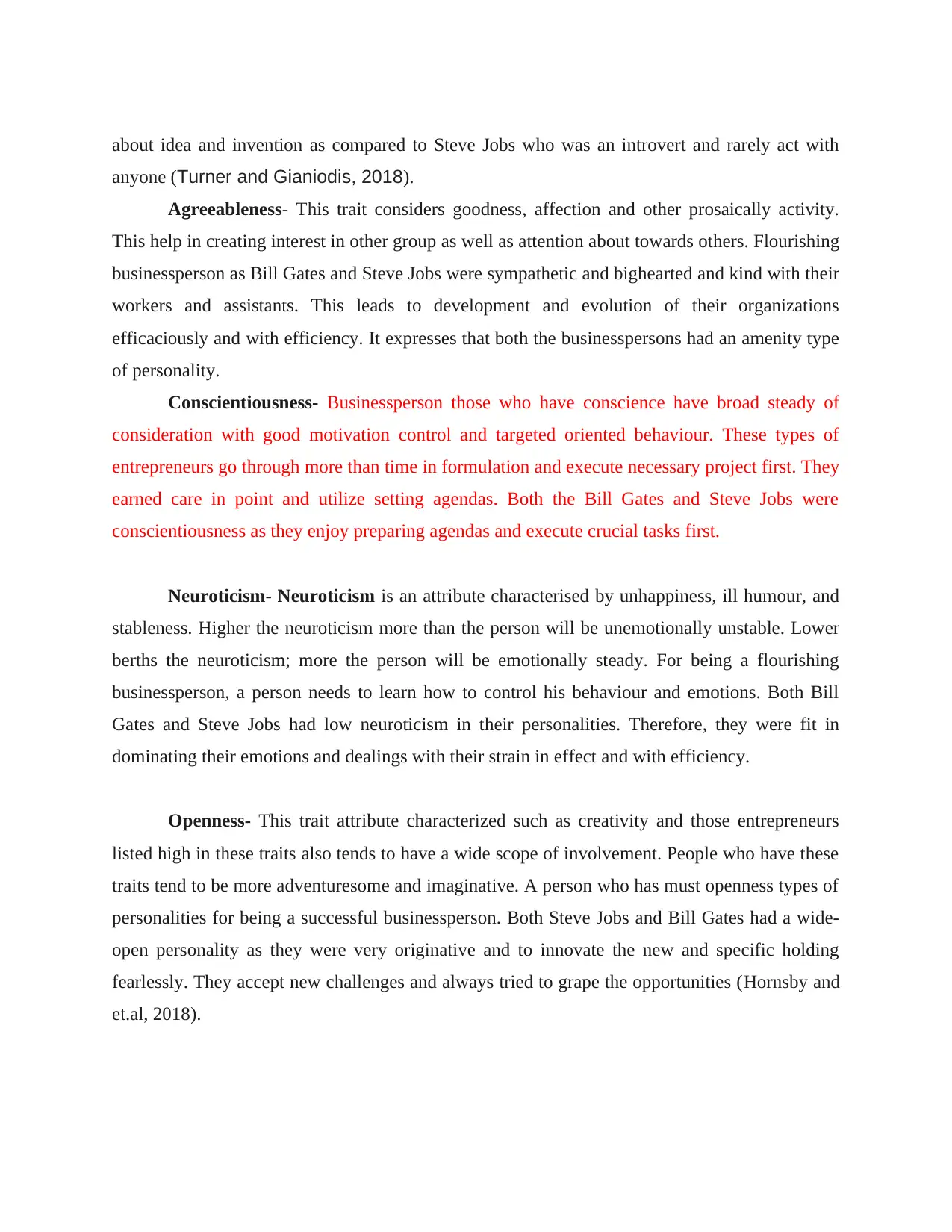
about idea and invention as compared to Steve Jobs who was an introvert and rarely act with
anyone (Turner and Gianiodis, 2018).
Agreeableness- This trait considers goodness, affection and other prosaically activity.
This help in creating interest in other group as well as attention about towards others. Flourishing
businessperson as Bill Gates and Steve Jobs were sympathetic and bighearted and kind with their
workers and assistants. This leads to development and evolution of their organizations
efficaciously and with efficiency. It expresses that both the businesspersons had an amenity type
of personality.
Conscientiousness- Businessperson those who have conscience have broad steady of
consideration with good motivation control and targeted oriented behaviour. These types of
entrepreneurs go through more than time in formulation and execute necessary project first. They
earned care in point and utilize setting agendas. Both the Bill Gates and Steve Jobs were
conscientiousness as they enjoy preparing agendas and execute crucial tasks first.
Neuroticism- Neuroticism is an attribute characterised by unhappiness, ill humour, and
stableness. Higher the neuroticism more than the person will be unemotionally unstable. Lower
berths the neuroticism; more the person will be emotionally steady. For being a flourishing
businessperson, a person needs to learn how to control his behaviour and emotions. Both Bill
Gates and Steve Jobs had low neuroticism in their personalities. Therefore, they were fit in
dominating their emotions and dealings with their strain in effect and with efficiency.
Openness- This trait attribute characterized such as creativity and those entrepreneurs
listed high in these traits also tends to have a wide scope of involvement. People who have these
traits tend to be more adventuresome and imaginative. A person who has must openness types of
personalities for being a successful businessperson. Both Steve Jobs and Bill Gates had a wide-
open personality as they were very originative and to innovate the new and specific holding
fearlessly. They accept new challenges and always tried to grape the opportunities (Hornsby and
et.al, 2018).
anyone (Turner and Gianiodis, 2018).
Agreeableness- This trait considers goodness, affection and other prosaically activity.
This help in creating interest in other group as well as attention about towards others. Flourishing
businessperson as Bill Gates and Steve Jobs were sympathetic and bighearted and kind with their
workers and assistants. This leads to development and evolution of their organizations
efficaciously and with efficiency. It expresses that both the businesspersons had an amenity type
of personality.
Conscientiousness- Businessperson those who have conscience have broad steady of
consideration with good motivation control and targeted oriented behaviour. These types of
entrepreneurs go through more than time in formulation and execute necessary project first. They
earned care in point and utilize setting agendas. Both the Bill Gates and Steve Jobs were
conscientiousness as they enjoy preparing agendas and execute crucial tasks first.
Neuroticism- Neuroticism is an attribute characterised by unhappiness, ill humour, and
stableness. Higher the neuroticism more than the person will be unemotionally unstable. Lower
berths the neuroticism; more the person will be emotionally steady. For being a flourishing
businessperson, a person needs to learn how to control his behaviour and emotions. Both Bill
Gates and Steve Jobs had low neuroticism in their personalities. Therefore, they were fit in
dominating their emotions and dealings with their strain in effect and with efficiency.
Openness- This trait attribute characterized such as creativity and those entrepreneurs
listed high in these traits also tends to have a wide scope of involvement. People who have these
traits tend to be more adventuresome and imaginative. A person who has must openness types of
personalities for being a successful businessperson. Both Steve Jobs and Bill Gates had a wide-
open personality as they were very originative and to innovate the new and specific holding
fearlessly. They accept new challenges and always tried to grape the opportunities (Hornsby and
et.al, 2018).
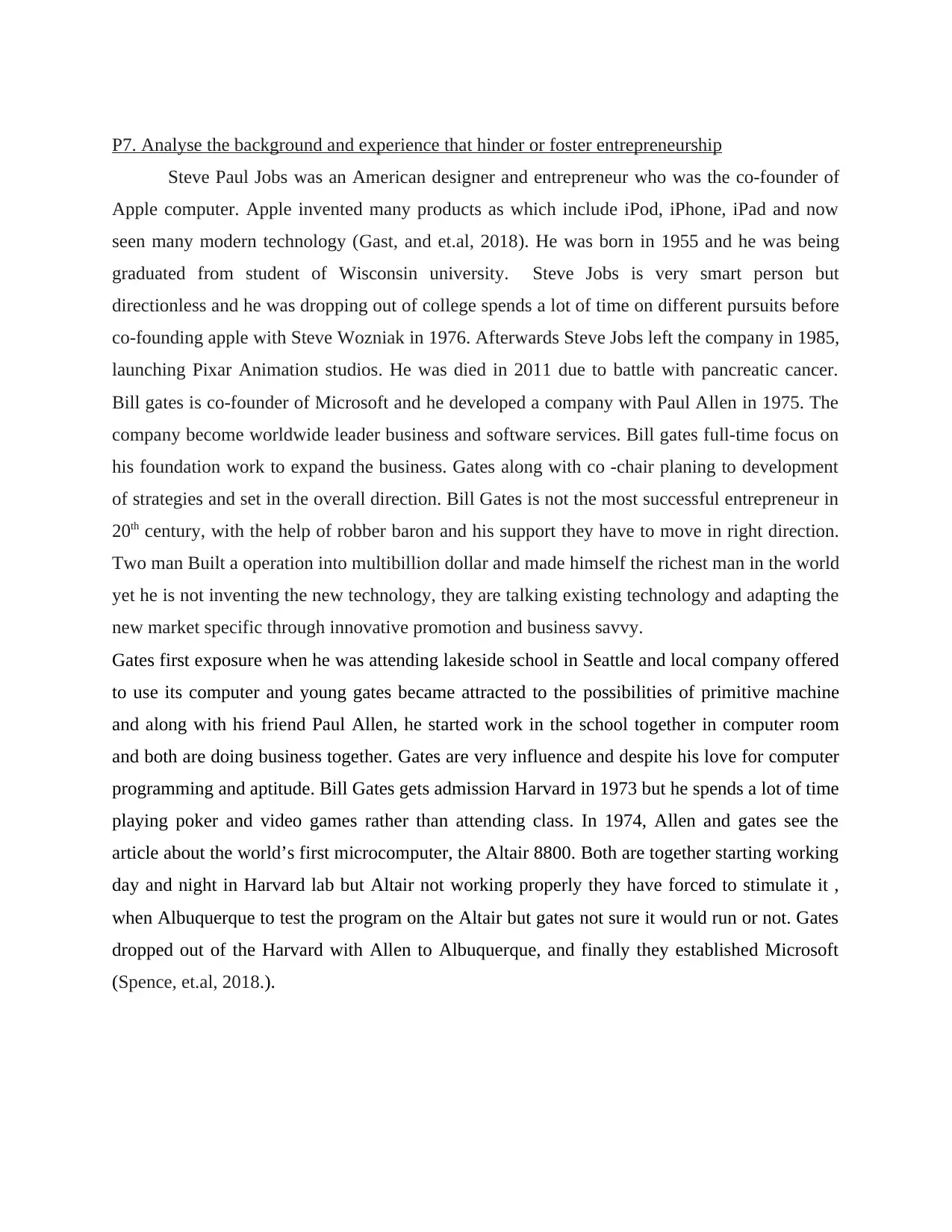
P7. Analyse the background and experience that hinder or foster entrepreneurship
Steve Paul Jobs was an American designer and entrepreneur who was the co-founder of
Apple computer. Apple invented many products as which include iPod, iPhone, iPad and now
seen many modern technology (Gast, and et.al, 2018). He was born in 1955 and he was being
graduated from student of Wisconsin university. Steve Jobs is very smart person but
directionless and he was dropping out of college spends a lot of time on different pursuits before
co-founding apple with Steve Wozniak in 1976. Afterwards Steve Jobs left the company in 1985,
launching Pixar Animation studios. He was died in 2011 due to battle with pancreatic cancer.
Bill gates is co-founder of Microsoft and he developed a company with Paul Allen in 1975. The
company become worldwide leader business and software services. Bill gates full-time focus on
his foundation work to expand the business. Gates along with co -chair planing to development
of strategies and set in the overall direction. Bill Gates is not the most successful entrepreneur in
20th century, with the help of robber baron and his support they have to move in right direction.
Two man Built a operation into multibillion dollar and made himself the richest man in the world
yet he is not inventing the new technology, they are talking existing technology and adapting the
new market specific through innovative promotion and business savvy.
Gates first exposure when he was attending lakeside school in Seattle and local company offered
to use its computer and young gates became attracted to the possibilities of primitive machine
and along with his friend Paul Allen, he started work in the school together in computer room
and both are doing business together. Gates are very influence and despite his love for computer
programming and aptitude. Bill Gates gets admission Harvard in 1973 but he spends a lot of time
playing poker and video games rather than attending class. In 1974, Allen and gates see the
article about the world’s first microcomputer, the Altair 8800. Both are together starting working
day and night in Harvard lab but Altair not working properly they have forced to stimulate it ,
when Albuquerque to test the program on the Altair but gates not sure it would run or not. Gates
dropped out of the Harvard with Allen to Albuquerque, and finally they established Microsoft
(Spence, et.al, 2018.).
Steve Paul Jobs was an American designer and entrepreneur who was the co-founder of
Apple computer. Apple invented many products as which include iPod, iPhone, iPad and now
seen many modern technology (Gast, and et.al, 2018). He was born in 1955 and he was being
graduated from student of Wisconsin university. Steve Jobs is very smart person but
directionless and he was dropping out of college spends a lot of time on different pursuits before
co-founding apple with Steve Wozniak in 1976. Afterwards Steve Jobs left the company in 1985,
launching Pixar Animation studios. He was died in 2011 due to battle with pancreatic cancer.
Bill gates is co-founder of Microsoft and he developed a company with Paul Allen in 1975. The
company become worldwide leader business and software services. Bill gates full-time focus on
his foundation work to expand the business. Gates along with co -chair planing to development
of strategies and set in the overall direction. Bill Gates is not the most successful entrepreneur in
20th century, with the help of robber baron and his support they have to move in right direction.
Two man Built a operation into multibillion dollar and made himself the richest man in the world
yet he is not inventing the new technology, they are talking existing technology and adapting the
new market specific through innovative promotion and business savvy.
Gates first exposure when he was attending lakeside school in Seattle and local company offered
to use its computer and young gates became attracted to the possibilities of primitive machine
and along with his friend Paul Allen, he started work in the school together in computer room
and both are doing business together. Gates are very influence and despite his love for computer
programming and aptitude. Bill Gates gets admission Harvard in 1973 but he spends a lot of time
playing poker and video games rather than attending class. In 1974, Allen and gates see the
article about the world’s first microcomputer, the Altair 8800. Both are together starting working
day and night in Harvard lab but Altair not working properly they have forced to stimulate it ,
when Albuquerque to test the program on the Altair but gates not sure it would run or not. Gates
dropped out of the Harvard with Allen to Albuquerque, and finally they established Microsoft
(Spence, et.al, 2018.).
⊘ This is a preview!⊘
Do you want full access?
Subscribe today to unlock all pages.

Trusted by 1+ million students worldwide
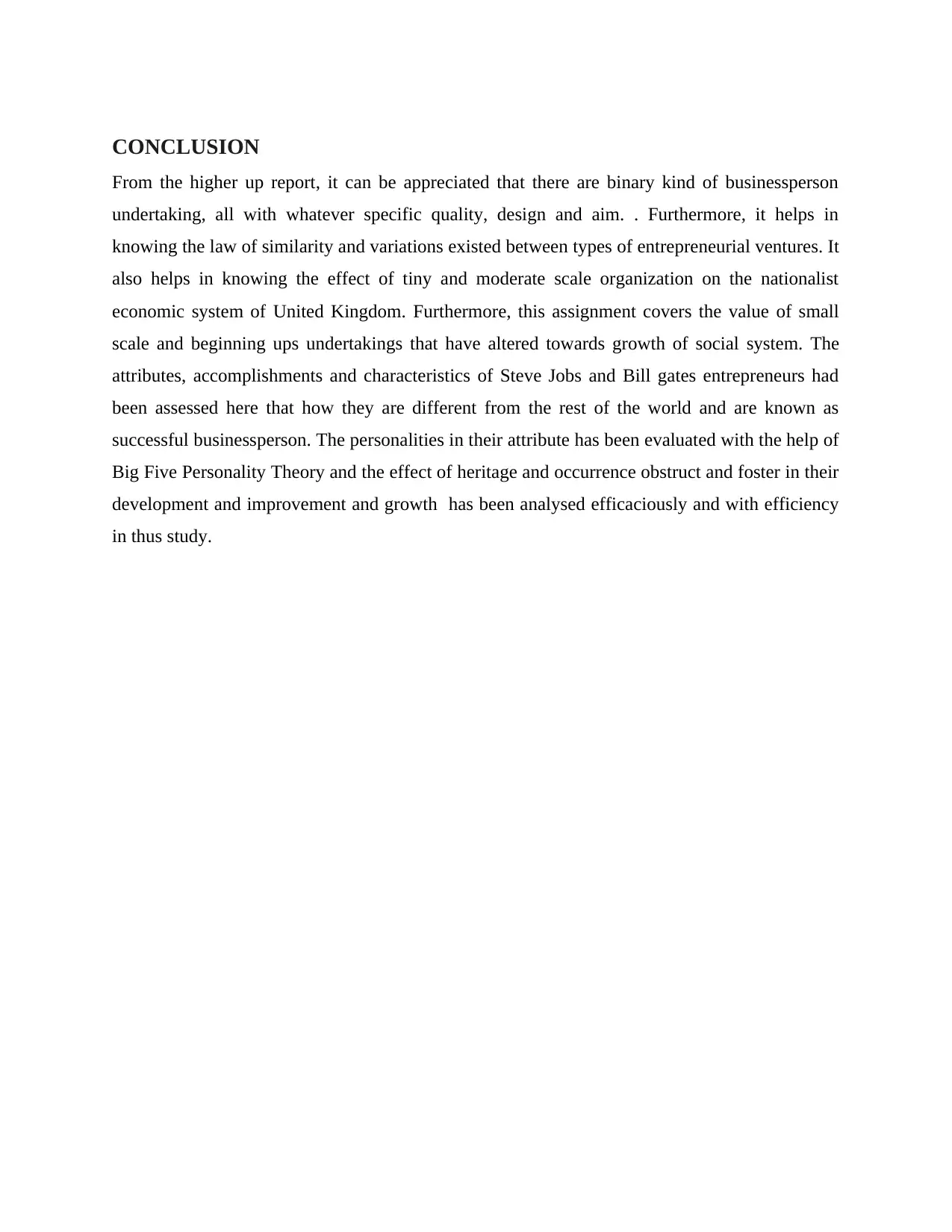
CONCLUSION
From the higher up report, it can be appreciated that there are binary kind of businessperson
undertaking, all with whatever specific quality, design and aim. . Furthermore, it helps in
knowing the law of similarity and variations existed between types of entrepreneurial ventures. It
also helps in knowing the effect of tiny and moderate scale organization on the nationalist
economic system of United Kingdom. Furthermore, this assignment covers the value of small
scale and beginning ups undertakings that have altered towards growth of social system. The
attributes, accomplishments and characteristics of Steve Jobs and Bill gates entrepreneurs had
been assessed here that how they are different from the rest of the world and are known as
successful businessperson. The personalities in their attribute has been evaluated with the help of
Big Five Personality Theory and the effect of heritage and occurrence obstruct and foster in their
development and improvement and growth has been analysed efficaciously and with efficiency
in thus study.
From the higher up report, it can be appreciated that there are binary kind of businessperson
undertaking, all with whatever specific quality, design and aim. . Furthermore, it helps in
knowing the law of similarity and variations existed between types of entrepreneurial ventures. It
also helps in knowing the effect of tiny and moderate scale organization on the nationalist
economic system of United Kingdom. Furthermore, this assignment covers the value of small
scale and beginning ups undertakings that have altered towards growth of social system. The
attributes, accomplishments and characteristics of Steve Jobs and Bill gates entrepreneurs had
been assessed here that how they are different from the rest of the world and are known as
successful businessperson. The personalities in their attribute has been evaluated with the help of
Big Five Personality Theory and the effect of heritage and occurrence obstruct and foster in their
development and improvement and growth has been analysed efficaciously and with efficiency
in thus study.
Paraphrase This Document
Need a fresh take? Get an instant paraphrase of this document with our AI Paraphraser
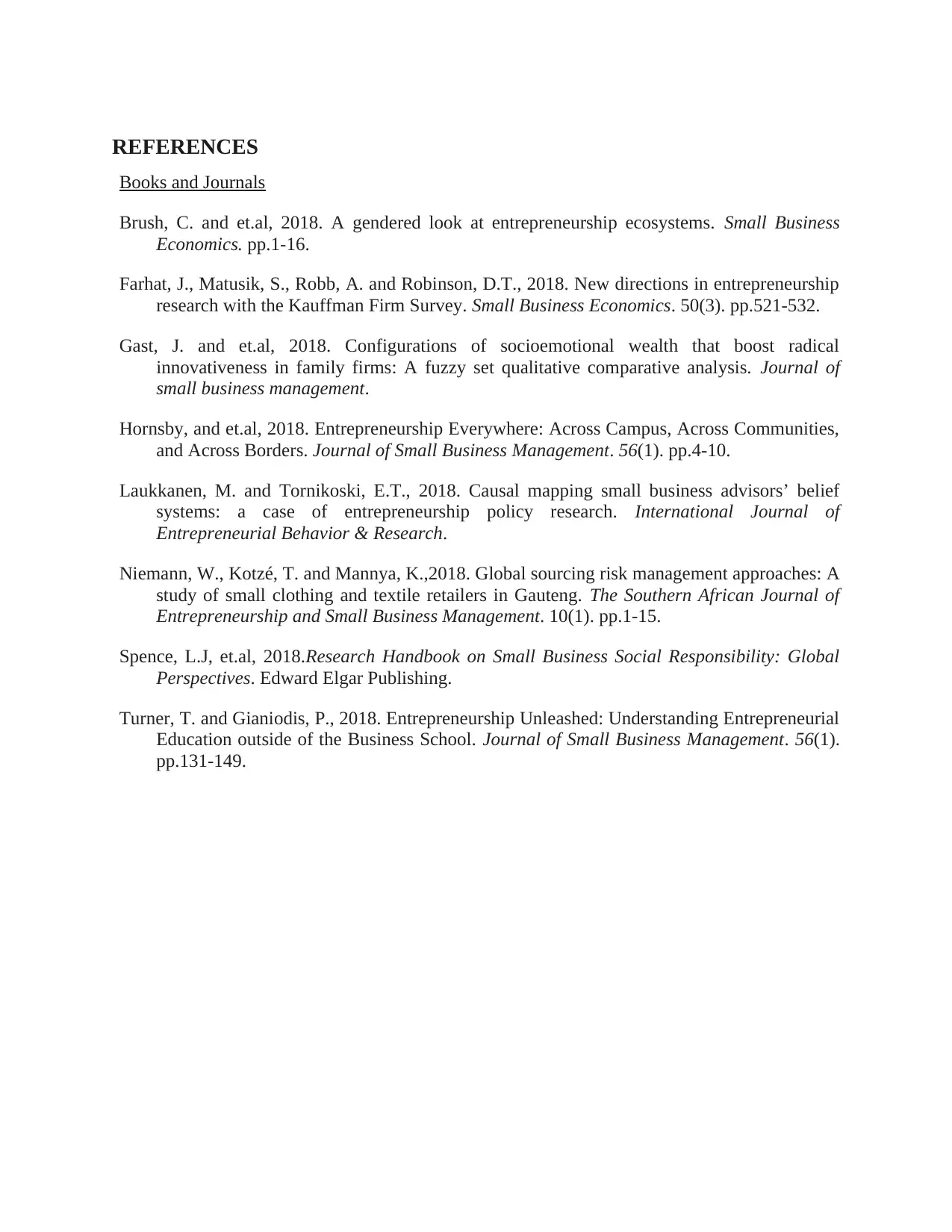
REFERENCES
Books and Journals
Brush, C. and et.al, 2018. A gendered look at entrepreneurship ecosystems. Small Business
Economics. pp.1-16.
Farhat, J., Matusik, S., Robb, A. and Robinson, D.T., 2018. New directions in entrepreneurship
research with the Kauffman Firm Survey. Small Business Economics. 50(3). pp.521-532.
Gast, J. and et.al, 2018. Configurations of socioemotional wealth that boost radical
innovativeness in family firms: A fuzzy set qualitative comparative analysis. Journal of
small business management.
Hornsby, and et.al, 2018. Entrepreneurship Everywhere: Across Campus, Across Communities,
and Across Borders. Journal of Small Business Management. 56(1). pp.4-10.
Laukkanen, M. and Tornikoski, E.T., 2018. Causal mapping small business advisors’ belief
systems: a case of entrepreneurship policy research. International Journal of
Entrepreneurial Behavior & Research.
Niemann, W., Kotzé, T. and Mannya, K.,2018. Global sourcing risk management approaches: A
study of small clothing and textile retailers in Gauteng. The Southern African Journal of
Entrepreneurship and Small Business Management. 10(1). pp.1-15.
Spence, L.J, et.al, 2018.Research Handbook on Small Business Social Responsibility: Global
Perspectives. Edward Elgar Publishing.
Turner, T. and Gianiodis, P., 2018. Entrepreneurship Unleashed: Understanding Entrepreneurial
Education outside of the Business School. Journal of Small Business Management. 56(1).
pp.131-149.
Books and Journals
Brush, C. and et.al, 2018. A gendered look at entrepreneurship ecosystems. Small Business
Economics. pp.1-16.
Farhat, J., Matusik, S., Robb, A. and Robinson, D.T., 2018. New directions in entrepreneurship
research with the Kauffman Firm Survey. Small Business Economics. 50(3). pp.521-532.
Gast, J. and et.al, 2018. Configurations of socioemotional wealth that boost radical
innovativeness in family firms: A fuzzy set qualitative comparative analysis. Journal of
small business management.
Hornsby, and et.al, 2018. Entrepreneurship Everywhere: Across Campus, Across Communities,
and Across Borders. Journal of Small Business Management. 56(1). pp.4-10.
Laukkanen, M. and Tornikoski, E.T., 2018. Causal mapping small business advisors’ belief
systems: a case of entrepreneurship policy research. International Journal of
Entrepreneurial Behavior & Research.
Niemann, W., Kotzé, T. and Mannya, K.,2018. Global sourcing risk management approaches: A
study of small clothing and textile retailers in Gauteng. The Southern African Journal of
Entrepreneurship and Small Business Management. 10(1). pp.1-15.
Spence, L.J, et.al, 2018.Research Handbook on Small Business Social Responsibility: Global
Perspectives. Edward Elgar Publishing.
Turner, T. and Gianiodis, P., 2018. Entrepreneurship Unleashed: Understanding Entrepreneurial
Education outside of the Business School. Journal of Small Business Management. 56(1).
pp.131-149.
1 out of 11
Related Documents
Your All-in-One AI-Powered Toolkit for Academic Success.
+13062052269
info@desklib.com
Available 24*7 on WhatsApp / Email
![[object Object]](/_next/static/media/star-bottom.7253800d.svg)
Unlock your academic potential
Copyright © 2020–2026 A2Z Services. All Rights Reserved. Developed and managed by ZUCOL.





